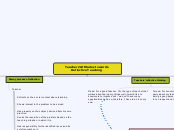Teachers’ Attitudes towards Reflective Teaching
What is reflective teaching?
According Schön (1987) reflection involves the relationship between an individual’s thought and action, and the relationship between an individual teacher and his or membership in a society. The first relationship involves the subjective perceptions in teachers’ heads, whereas the second explores consciously the relationship between individual teaching actions and purposes of education in society.
According Cruickshank (1981) defines RT as the teacher’s thinking about what happens in classroom lessons, and thinking about alternative means of achieving goals or aims. According to this definition, reflective teaching is “an opportunity to consider the teaching event thoughtfully, analytically and objectively. The purpose of RT is to engender good thought habits”.
Dewey process of reflection
Teacher
Reflects on the social context where teaching
Shows interest in the problem to be solved
Has property on the subject, derived from his own practice.
Seeks the resolution of the problem based on the teaching situation in which it is.
Has responsibility for the identified issue and its solution rests on it.
Test your ideas through the practice of teaching.
Once tested their ideas through practice, should lead to some course of action.
With its reflective actions can transform a new understanding and redefined practice in teaching.
With its demonstrated practice leads to a type of action that results a change.
On their reflective actions causes new understanding and changes in teaching.
Teachers’ reflective thinking
Maria: I’m a good teacher. I’m the type of teacher that worries about doing my things well, I would like to know more to improve but... we don’t have many opportunities to do so; therefore, I have to do it on my own.
Teresa: I’m concerned about my students. I usually worry about my teaching but I’m also concerned about being a good person as well. Here you have to work a lot on respect and tolerance.
Teachers` innovation
Participate in a PDP to:
as an opportunity for their professional development
acquire practical knowledge and skills
develop a sense of awareness about their actions
familiarize yourself with reflective teaching
